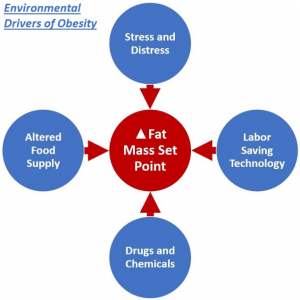By Ted Kyle

If you think obesity is a simple problem with a simple cause, you are not alone. The most common assumption is that obesity is merely the result of eating too much and moving too little. But unfortunately, the truth is that it’s a complex chronic disease caused by many different factors. The obesity system map you see above was an attempt to map all the factors that come into play with obesity.
Even with all the complexity of that map, it’s probably incomplete.
Genes Set the Table, the Environment Serves It Up
Scientists have known for decades that most of an individual’s risk for developing obesity is driven by genetics. In fact, the heritability of obesity is roughly 70 percent. But more people are getting obesity now, because many more factors in our daily lives are triggering it. The food supply has changed. In hundreds of small ways, technology saves us from physical effort – to move around, to do our jobs, to entertain ourselves. And then drugs we take and chemicals in our environment change how our body regulates our metabolism.
Over time, the effect of these factors adds up, especially for susceptible individuals. That’s why about 40 percent of adults now have obesity – a huge increase over the last three decades.
Simply Losing Weight Doesn’t Fix It
As anyone who has ever tried can tell you, simply losing weight is not a problem. But it’s not a lasting solution, either. Study after study has shown that people can lose five or ten percent of their weight easily enough. But after six months, homeostasis takes over. That is, a person’s hypothalamus adjusts appetite and metabolism so that it can restore fat stores to prior levels.
That’s why most people eventually wind up regaining most of the weight they lose. It’s a normal bodily function that goes awry in obesity. Willpower will not change this dysfunctional physiology any more than it will cure diabetes.
Stigma Gets in the Way
Stigma and bias make this worse. People living with obesity, especially severe obesity, live with daily humiliations from people who assume they are taking poor care of themselves. Someone might have lost weight and be the healthiest they’ve ever been. But if they don’t conform to unrealistic expectations for thinness, they’ll receive endless demeaning comments and treatment. Research shows this leads to more obesity and worsening health.
Better Options, But One Size Doesn’t Fit All
Fortunately, we have much better options for reducing the harm of obesity than we had just a few years ago. Intensive behavioral support can help people improve their health and maintain a healthier weight. Anti-obesity medicines can offer further improvements in health. And for people with more serious obesity, surgery can put complications like diabetes into remission, prevent complications and extend a person’s life. None of these options are perfect, so individual responses will vary. But they can be quite helpful.
Obesity System Map, from Vandenbroeck et al, 2007
Ted Kyle is a pharmacist and healthcare innovation professional who serves on the Board of Directors for the Obesity Action Coalition and advises The Obesity Society on advocacy. His widely-read daily commentary, published at conscienhealth.org/news, reaches an audience of more than 15,000 thought leaders in health and obesity.
The opinions, beliefs and viewpoints express by the authors do not necessarily reflect the opinions, beliefs and viewpoints of Pittsburgh Business Group on Health, its board or its employees.
Post a Comment